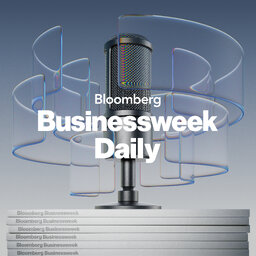How the Subtle but Significant Consequences of a Hotter Planet Have Already Begun
What would YOU like to hear about on Bloomberg? Help make shows like ours even better by taking our Bloomberg Audience Survey https://bit.ly/48b5Rdn
Watch Carol and Tim LIVE every day on YouTube: http://bit.ly/3vTiACF.
R. Jisung Park, Assistant Professor at the University of Pennsylvania, discusses his book Slow Burn: The Hidden Costs of a Warming World.
Hosts: Tim Stenovec and Katie Greifeld. Producer: Paul Brennan.
In 1 playlist(s)
Bloomberg Businessweek
Carol Massar and Tim Stenovec bring you reporting from the magazine that helps global leaders stay a…Social links
Follow podcast
Recent clips

Bank CEOs Say $134 Billion Trading Record Is Just the Start
37:13

Women's Sports Leagues Battling for Talent
08:38

Germany Leads Military Buildup in Greenland in Response to Trump
36:56
 Bloomberg Businessweek
Bloomberg Businessweek